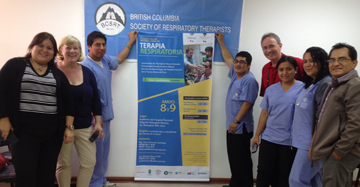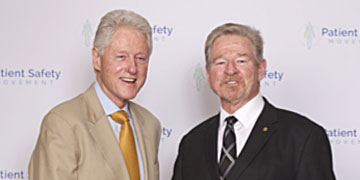
British Columbia RT’s Teach in Peru
June 20, 2014
COPD Foundation Establishes Fundación EPOC
June 30, 2014Patrick J Dunne, MEd, RRT, FAARC
ICRC Governor, USA
Earlier this year, I was honored to represent the AARC at the Second Annual Patient Safety, Science and Technology Summit, held January 11-13 in Laguna Niguel, CA. The summit was convened and sponsored jointly by the Patient Safety Movement and the Joint Commission Center for Transforming Healthcare to develop actionable ideas and innovations to improve patient safety and eliminate preventable deaths. It is estimated that in the US alone, more than 200,000 patients die each year from preventable medical mistakes. Many thousand more suffer injuries and complications requiring additional care, not to mention the number of near misses that never get reported. The stated goal of the Patient Safety Movement is zero deaths by 2020 from preventable medical mistakes.
The wide range of distinguished invited speakers from both the national and international health care community underscored the global importance of this event. The list included health care leaders, administrators, providers, regulators, researchers, manufacturers and patient/family members from around the world. Each speaker addressed an important aspect of patient safety. For example, former US President Bill Clinton delivered the Keynote Address, explaining how and why the Clinton Foundation has become so active in the quest to eliminate medical mistakes. The former President was joined by US Senator Barbara Boxer, Dr. Mark Chassin, CEO of The Joint Commission, and Dr. Patrick Conway, Chief Medical Officer of the Centers for Medicare and Medicaid Services. A common theme in all presentations was the need to raise awareness of the importance of reducing healthcare-acquired infections, creating a system wide culture of safety, and improving communications during patient hand-off. Several first-hand patient vignettes drove home the huge emotional loss suffered when a loved one’s life is lost as a result of a preventable medical mistake.
Representing the international community were Dr. Thomas Zeltner, Special Envoy of the Director General of the World Health Organization (WHO), who was joined by Sir Liam Donaldson, the WHO’s Envoy for Patient Safety. Both of these luminaries shared concerns within the WHO about the growing incidence of mortality and morbidity associated with preventable medical mistakes that occur in hospitals around the world. The issue has clearly become a major global health care concern requiring immediate attention. A detailed article describing the Summit can be found in the May 2014 issue of AARCTimes. During the Summit, AARC member Jon Carlson received one of four prestigious Humanitarian Awards for designing and implementing a continuous monitoring system credited with saving 10 lives during the first year.
In response to this growing challenge and the opportunity it portends, the AARC Board of Directors recently approved formation of a Patient Safety Roundtable. This move provides members interested in patient safety with an on-line forum in which ideas and best practices to improve patient safety can be shared and discussed. The Roundtable will be co-chaired by long-time AARC members Steve Sittig and Kevin McQueen. Both of these gentlemen attended the Patient Safety Summit, and for years have been strong advocates of the importance of improving patient safety for respiratory patients. Any AARC member can join the roundtable and actively participate, or simply keep abreast of developments by reading the daily posts of others.
Our international colleagues can join the Patient Safety Roundtable by visiting the AARC website and entering AARConnect, the Association’s social media site Next visit the Patient Safety Roundtable Community Page, and the click on the green Join Community button. I look forward to learning more about what our international colleagues are doing to improve patient safety. I believe that by working together and sharing ideas, we can help one another make significant gains in this most important global health care initiative.



